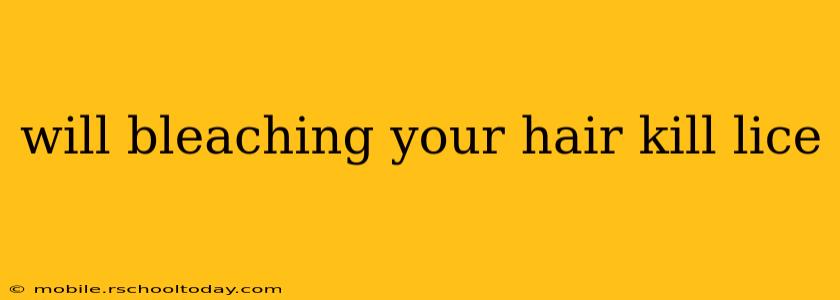Will Bleaching Your Hair Kill Lice? The Truth About Lice and Hair Treatments
The short answer is: no, bleaching your hair will not kill lice. While the harsh chemicals in bleach can be damaging to hair, they are not effective at eliminating head lice. In fact, attempting to use bleach to treat lice can be incredibly dangerous and harmful to your scalp and hair.
This misconception likely arises from the understanding that bleach is a powerful disinfectant. However, lice infestations require a specific type of treatment, and bleach simply isn't it. Let's delve deeper into why this is the case and explore safer, more effective methods for lice removal.
What are the dangers of using bleach on your hair to treat lice?
Using bleach on your hair to kill lice is incredibly risky and should never be attempted. Bleach is a corrosive chemical that can cause severe damage, including:
- Chemical burns: Bleach can burn your scalp, causing pain, inflammation, and potentially scarring.
- Hair damage: Bleach can severely damage or even destroy your hair, leading to breakage, dryness, and irreversible damage.
- Allergic reactions: Some individuals are allergic to bleach, and exposure can trigger a severe allergic reaction.
These risks far outweigh any potential (and nonexistent) benefits of using bleach for lice treatment.
How do I get rid of head lice effectively?
There are several safe and effective ways to treat head lice. These methods are generally recommended by healthcare professionals and pediatricians:
-
Over-the-counter lice treatments: Pharmacies offer various lotions and shampoos specifically designed to kill lice and their eggs (nits). Always follow the product instructions carefully. These treatments typically contain pyrethrins or permethrin.
-
Wet combing: This method involves using a fine-toothed comb to manually remove lice and nits from the hair after applying conditioner. It's effective, especially when used in conjunction with other treatments.
-
Professional lice removal services: Several professional services specialize in lice removal. They often use a combination of methods to ensure complete eradication.
-
Seeking advice from a healthcare professional: If you're struggling to eliminate lice, or if you have concerns about treatment, it's always best to consult a doctor or other qualified healthcare professional. They can provide personalized guidance and recommend the best course of action.
What are the signs of a head lice infestation?
Recognizing the signs of head lice is crucial for prompt treatment. Common symptoms include:
- Itching: Intense itching of the scalp is a primary symptom.
- Nits: These are small, white or tan eggs attached to the hair shaft, typically close to the scalp.
- Live lice: Small, six-legged insects that move quickly through the hair.
Are there home remedies for head lice?
While many home remedies are touted for lice treatment, their effectiveness is not consistently proven. It's crucial to rely on scientifically-backed methods to ensure complete eradication. While some may offer temporary relief from itching, they don't effectively kill lice and their eggs. Always consult a healthcare professional before trying any home remedy for head lice.
How can I prevent head lice?
Prevention is key. While you can't completely eliminate the risk, here are some preventative measures:
- Avoid head-to-head contact: Encourage children to avoid close contact with others' heads, especially during playtime.
- Regular hair checks: Regularly inspect your hair and your children's hair for lice and nits.
- Don't share personal items: Avoid sharing hats, combs, brushes, and other personal items.
In conclusion, using bleach to treat head lice is dangerous and ineffective. Stick to proven, safe methods to treat lice infestations and consult a healthcare professional if you have any questions or concerns. Remember, prevention is key in avoiding head lice in the first place.
